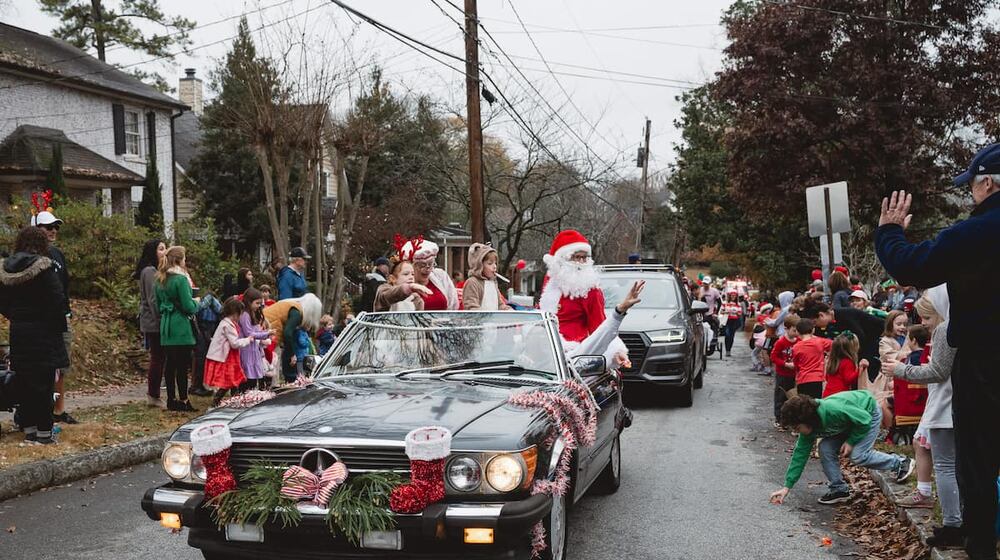On a recent Sunday at Sifly Piazza — the courtyard connecting the High Museum of Art and the Memorial Arts Building at Woodruff Arts Center — a group of spectators, dancers and the mayor of Atlanta stood in the blazing hot sun while reciting 10 affirmations.
The first: “I will greet this day with love in my heart”.
The last: “I will not use the word ‘can’t’ to define my possibilities.”
The affirmations, printed on paper fans and handed out to the crowd, were a reminder that the performance we were awaiting, by Ailey Camp Atlanta dancers, was about much more than dance.
“Dancing is fun, and it is what Ailey does well. But when you can engage a young person in a series of reflective conversations about what is going on in the world and what is going on with them, that is very different,” said Nasha Thomas, the national director of Ailey Camp.
Ailey Camp was the last program created by Alvin Ailey, founder of the eponymous dance company, before his death in 1989. It has since grown to a 10-city program designed to uplift underserved children ages 11 to 14. The program came to Atlanta about 18 years ago and today operates in partnership with Purpose Built Schools (PBS).
About 80% of the program participants come from the PBS school cluster — Slater Elementary, Price Middle and Carver STEAM Academy. Twenty-five young people are working with the camp as part of Mayor Andre Dickens’ “Year of the Youth” initiative.
“Research shows that arts education, especially dance and creative movement, help foster self-esteem, build leadership skills and, most importantly, empower our youth to dream big and think about their futures beyond their current surroundings,” said Mike Davis, CEO of PBS.
Credit: Nedra Rhone
Credit: Nedra Rhone
His comments made me think of a recent two-part series by my colleague Matt Kempner that chronicled the life of Gerard Alexander, a professional dancer who died homeless in Atlanta. Alexander, who attended the Ailey School on scholarship as a teenager, was an accomplished dancer who struggled with drugs for most of his life. His passion for dance never seemed to wane — it just couldn’t save him.
I wonder how Alexander’s trajectory may have changed if he had more resources.
Ailey Camp isn’t designed as a training ground for professional dancers, though some students do earn scholarships to study at the Ailey School or other programs. Two alums of the camp – Solomon Dumas and Christopher Taylor – are currently performing as company dancers.
At Ailey Camp, it’s just as important for participants to learn life skills as it is to learn dance. skills
“Dance is a discipline. There is a difference between dancing and moving,” said Joy Pigg, the Atlanta director of Ailey Camp. “To say we are dancing means we thought about a step, a placement of our arms, legs and feet. There is such intentionality.”
The hope is that being intentional in dance will lead to being intentional in everything, she said.
For the duration of the six-week program, Ailey Camp participants are asked to think about what they are doing in their lives, what is important and what they should be focusing on.
One day, they will look back and remember those moments of being told they are special, worthy and that they each have a part to play in the world, Pigg said.
“When the program started in 1989, it was for at-risk youth. We can’t say that anymore because all the kids are at-risk,” Thomas said, noting the challenges that students have faced as a result of the global pandemic.
Thomas, a former Ailey company dancer, has served as national director of Ailey Camp for 24 years. She said she hopes to expand Ailey Camp to more cities, such as New Orleans and Los Angeles, because such programs are so desperately needed. But expansion requires partners that are aligned in mission and can provide funding.
Authors of a 2022 study found that children benefit emotionally and physically from dance and the implementation of dance programs deserves political and financial support from policy makers.
“No matter what happens in education or in the surrounding communities, kids will always need an outlet of creative expression,” said Pigg, “and a reminder of how to know themselves and how to love themselves.”
Read more on the Real Life blog (www.ajc.com/opinion/real-life-blog/) and find Nedra on Facebook (www.facebook.com/AJCRealLifeColumn) and Twitter (@nrhoneajc) or email her at nedra.rhone@ajc.com.






